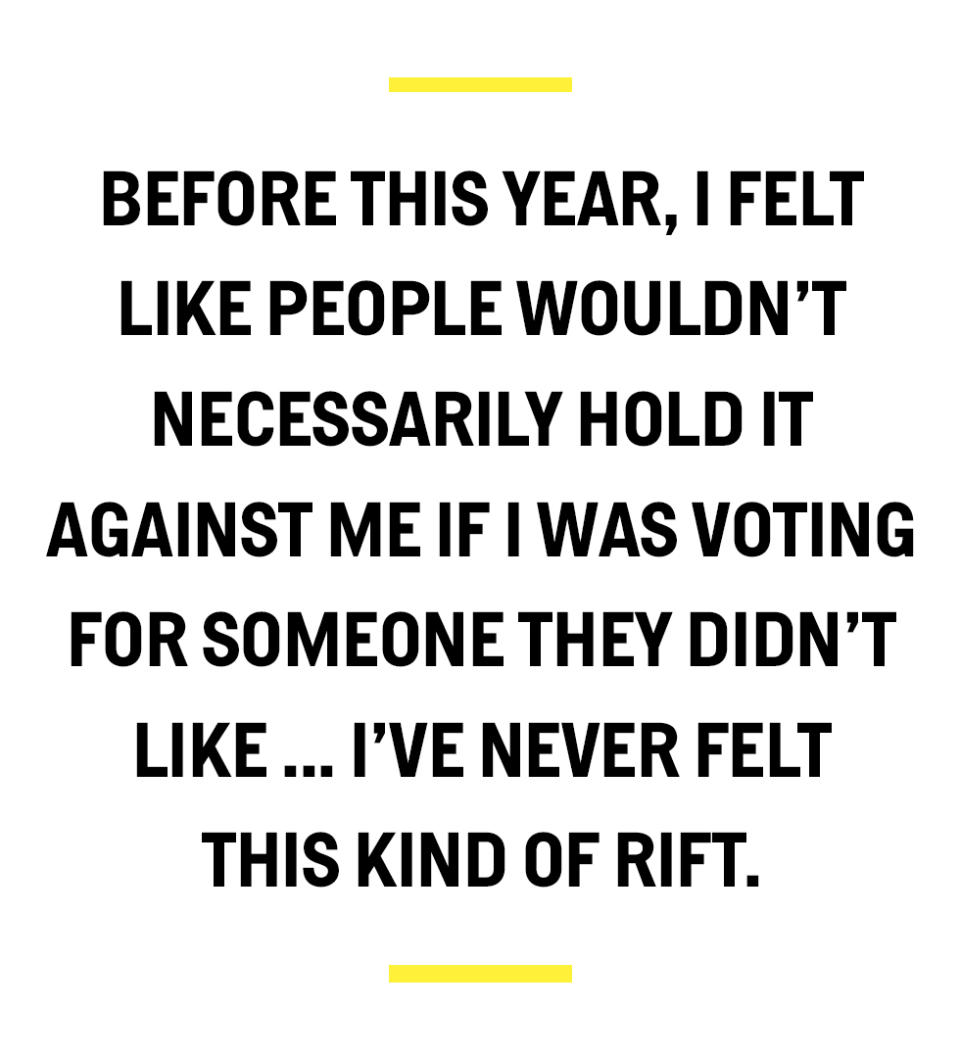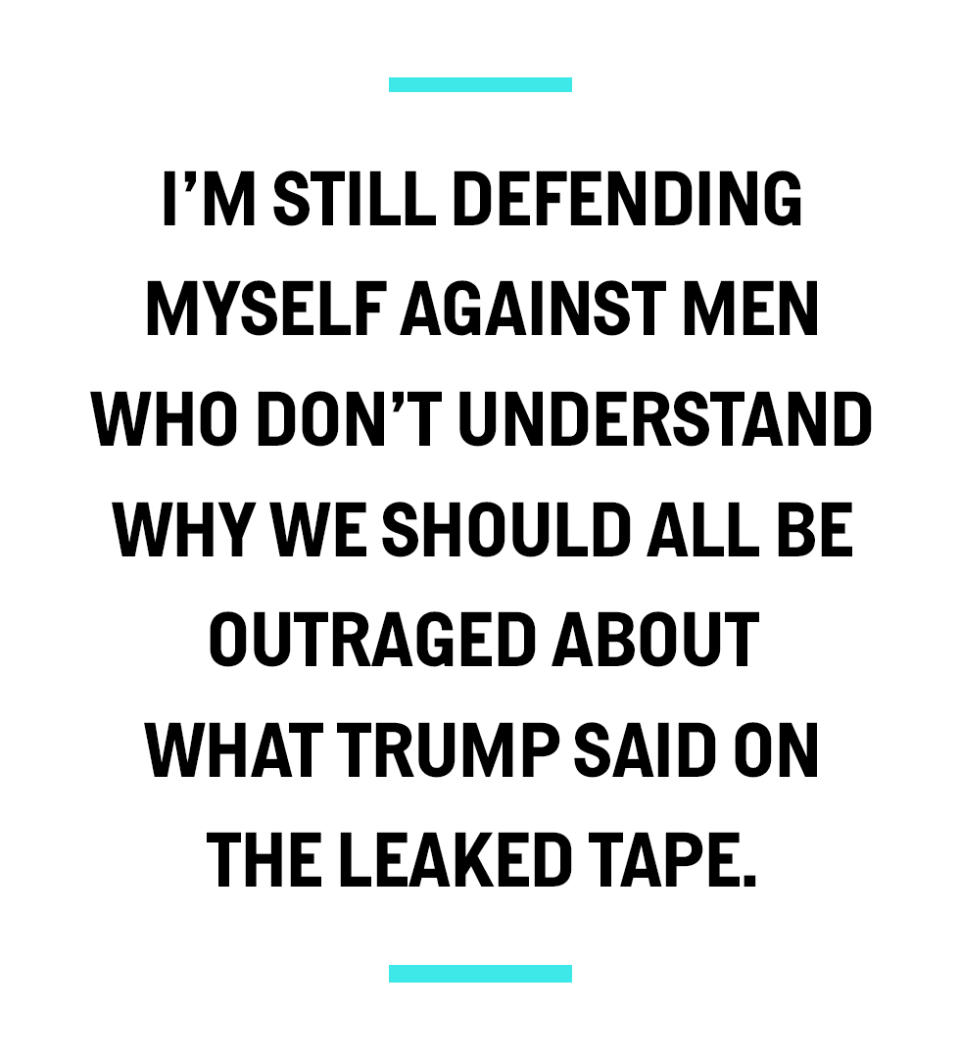How the Election Hurts Relationships

Every four years, the presidential election campaign inevitably sparks some awkward dinner-table conversations between family members or friends with different political views. But for Cosmopolitan.com readers this year, tensions over the candidates go far beyond dueling bumper stickers on a shared car or even a heated Facebook debate over the issues. In a new survey, 42 percent of 1,097 women between the ages of 18 and 34, randomly selected from among Cosmopolitan.com newsletter subscribers who said they are likely to vote in November, said the 2016 presidential campaign has negatively affected their relationship with someone close to them.
Regardless of which candidate they are planning to support, there was a strong consensus among these respondents to the survey, which was conducted in partnership with John Della Volpe, CEO of SocialSphere and director of polling at the Harvard Institute for Politics, that this year’s campaign had provoked some of the most uncomfortable and acrimonious conversations in recent memory.
Savannah, a 21-year-old student in Colorado who hasn’t decided who she’ll be supporting in November, said she’s used to being more politically conservative than her friends. But when people found out she was considering voting for Donald Trump, the Republican presidential nominee, they often jumped to attack her. “There’s this immediate, very strong assumption that if you’re thinking about voting Republican this year, you must be a horrible person who condones everything that Donald Trump says and agrees with him on every point,” she said. The election has created tensions with some of her friends, with whom she says she no longer discusses politics. “It’s really frustrating because before this year, I felt like people wouldn’t necessarily hold it against me if I was voting for someone they didn’t like,” she says. “It’s always been civil before. I’ve never felt this kind of rift.”

Cindy Magaña, a 33-year-old attorney from California, typically votes Republican but decided she couldn’t vote for Trump after watching the leaked video of his conversation with Billy Bush, where he discussed groping and kissing women without their consent. Some people who are close to her, though, are still likely to vote for Trump - a prospect that is “very upsetting,” she said. “We’ve had discussion, back and forth, about how they really shouldn’t support him. I normally never disagree with [them] on politics, but this year I just don’t understand how they could support him - they’re conservative, they have high moral standards, and he’s just so far from that.”
Some Cosmopolitan.com readers said they hoped the leaked video – and the flood of sexual assault and harassment allegations against Trump that began to appear in the days after the second presidential debate – would sway their family members’ views. Alyssa Schmidt, 29, a graduate student in Florida who’s supporting Hillary Clinton, said she planned to talk to her conservative father about the tape. “My father is Republican and we disagree about pretty much everything, but he has four daughters and I am really hoping that he’s going to think again about Trump because of this,” she said. “We’re a Christian family and we believe that you say the right thing no matter who is listening or watching. I sure hope he’s upset about those comments.”
Schmidt, who grew up in Idaho, added that she had been forced to unfollow old friends on Facebook because of the political views they were sharing. “I get that Idaho is a more conservative place and my worldview is different, but the things people post are just so hurtful, they make me really angry,” she said. “People use derogatory terms for our current president, they say Hillary Clinton just wants to help people in the ghetto – I’m a person of mixed-race, and I have to believe they wouldn’t say that to my face.”
Her perspective - that Facebook and other forms of social media had become a toxic forum - was widely shared among Cosmopolitan.com readers. Maggie Mahoney, a 32-year-old legal assistant in Columbus, Ohio, who plans to vote for Clinton, deactivated her Facebook to avoid conflict with family members who live in more rural parts of the state.
Others who do choose to engage with friends and family on Facebook said they rarely felt like they were having productive conversations. “It makes me so angry – I’m still defending myself against men who don’t understand why we should all be outraged about what Trump said on the leaked tape,” said Caitlin Dowd, 30, a Clinton supporter who lives in New York City and works at an auction house. “I hate that I’m having to have to list out all the sexual violence, subtle or explicit, that I and other women are systematically subjected to throughout our lives.”

The personal rifts that the 2016 campaign has caused may prove difficult to mend, even after the election is over. Amy, a 24-year-old student in Oklahoma who is supporting Clinton, said she stopped speaking to a close friend during the Republican primary because he agreed so enthusiastically with Trump’s views on immigration. She’s also been shaken by family members’ vocal support for Trump. “This divide is so much deeper than just policy,” she said. “In a way, it’s really about character. You want to keep people out who are fleeing their countries because they’re scared and hurt and don’t have basic human needs – food, water, a roof over their heads. It seems like we’re trying to keep them out because we’re worried about our own comfort, and I truly can’t fathom that.”
Amy said she doesn’t know what it will take to heal these relationships. “They truly believe these things, and I can’t ask them not to feel what they feel,” she said. “I’m hoping time will help make things civil and friendly again, but I do wonder if I’ll be able to see these people in the same way.”
Follow Amelia on Twitter.
You Might Also Like

